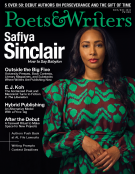When Jorge Torres set out to write an essay for his Detroit high school’s literary magazine, he wanted something that captured who he was and how he’d grown. He started drafting it in the summer of 2021 and continued tweaking it for the next six months. “I just worked on it every day, really trying to properly represent myself,” Torres says. The resulting essay, “The Book’s Cover,” is a deeply personal and thoughtful piece about feeling torn between two worlds, growing up in the United States in a family of Mexican immigrants. “In America I was too pale for my name, and now I was too pale for my culture,” Torres writes. “I felt that I belonged nowhere, and I began to distance myself from my culture and roots.”
Torres’s essay appears in DePaul’s Blue Book: Best American High School Writing 2022, published by DePaul University in Chicago in July. The anthology includes writing by students from ten states and the Dominican Republic, representing a diverse range of voices tackling genres from investigative journalism to poetry and subjects ranging from coming of age to living in a patriarchal society. The next installment of Blue Book is slated for release in May 2024, submissions for which are being accepted through the end of January 2024 at blogs.depaul.edu/bluebook/submit.
Named after the sky-colored paper booklets traditionally used for student exams, Blue Book was the brainchild of Chris Solís Green, DePaul’s director of writing and publishing internships as well as distinguished writer-in-residence. Before coming to DePaul in 2011, Green was a high school English teacher in Utah and Florida, where he learned how engaging young authors’ writing can be.
“I don’t think much high school writing really gets a look,” says Green, Blue Book’s editor. “Maybe framing it in this way will bring some attention to the quality of thinking and writing that’s happening in our high schools.”
Previously, Green edited DePaul’s Blue Book: Best of Illinois High School Writing. He thought it would be ideal to take Blue Book national, and with the help of Miles Harvey, director of the DePaul Publishing Institute, Green applied for and received a two-year $100,000 grant from the university. Thanks to the grant, Green was able to publish two annual installments of the national anthology, hiring seven DePaul students to help with the editorial process and website, including four graduate student editors.
Soliciting submissions took a “certain amount of detective work,” which began last summer, Green says. Each student editor was assigned multiple states and sifted through countless high school websites, hunting down contact information for faculty members in charge of school newspapers and literary magazines. They also ran a social media campaign to encourage students to submit their work, whether or not previously published. In the end they received 123 literary magazine submissions and fifty-seven newspaper submissions from teachers, plus 402 individual submissions of poetry, fiction, and nonfiction directly from high school students.
“We wanted to simply be as open as we could to a diverse group of writers, to a diversity of issues,” Green says. “Like anyone, we all relied on our reading experience to tell us what we felt should be moved along the chain.”
All submissions were read by the student workers first, and Green says their input was invaluable. “My editors’ choices...sometimes would surprise me,” he says. “So I was lucky to have their life experience to help me see pieces that maybe I would have passed over.”
A digital version of the current Blue Book is available free online. Complimentary print copies were sent to contributors, finalists, and teachers who submitted selected work, and others can order from a limited number of free anthologies available by request through an online order form at blogs.depaul.edu/bluebook/order.
For Vanessa Moreno, seeing her investigative article on her city’s opioid epidemic in Blue Book—after it first appeared in her school newspaper in McHenry, Illinois—was validation that her work was important and deserved to be shared.
“I think it’s nice to be able to have a collection of student work, especially because high school students now are, like, the next generation of writers,” says Moreno, who is a first-year journalism student at Illinois State University. “So I think it’s really encouraging to have things like this.”
For Torres, who is currently studying computer science at Yale University, being published in Blue Book cemented writing’s place in his life and gave him the courage to share his story. “After speaking to a couple of my teachers, that helped me organize my thoughts and put it all onto paper. They really pushed me and told me that it was a good piece and that it was really representative of who I was and that it was something that might help other people who want to express themselves,” he says.
The future of Blue Book is undecided. Whether a 2024 installment will be published depends on DePaul’s willingness to continue funding it, Green says. But he hopes the university will and that Blue Book will increase awareness of the immense talent among high school writers.
“There’s such a variety of styles and concerns throughout the book: immigration stories, the importance of family, the difficulty of growing up, the difficulty of being a young woman in a patriarchy in America,” Green says. “It really is like a touchstone for the kinds of things that we see in media all the time. It’s refreshing to see young people thinking so sharply about these issues that get dealt with so superficially.”
Brittany Moseley is a writer and editor based in Columbus, Ohio.








